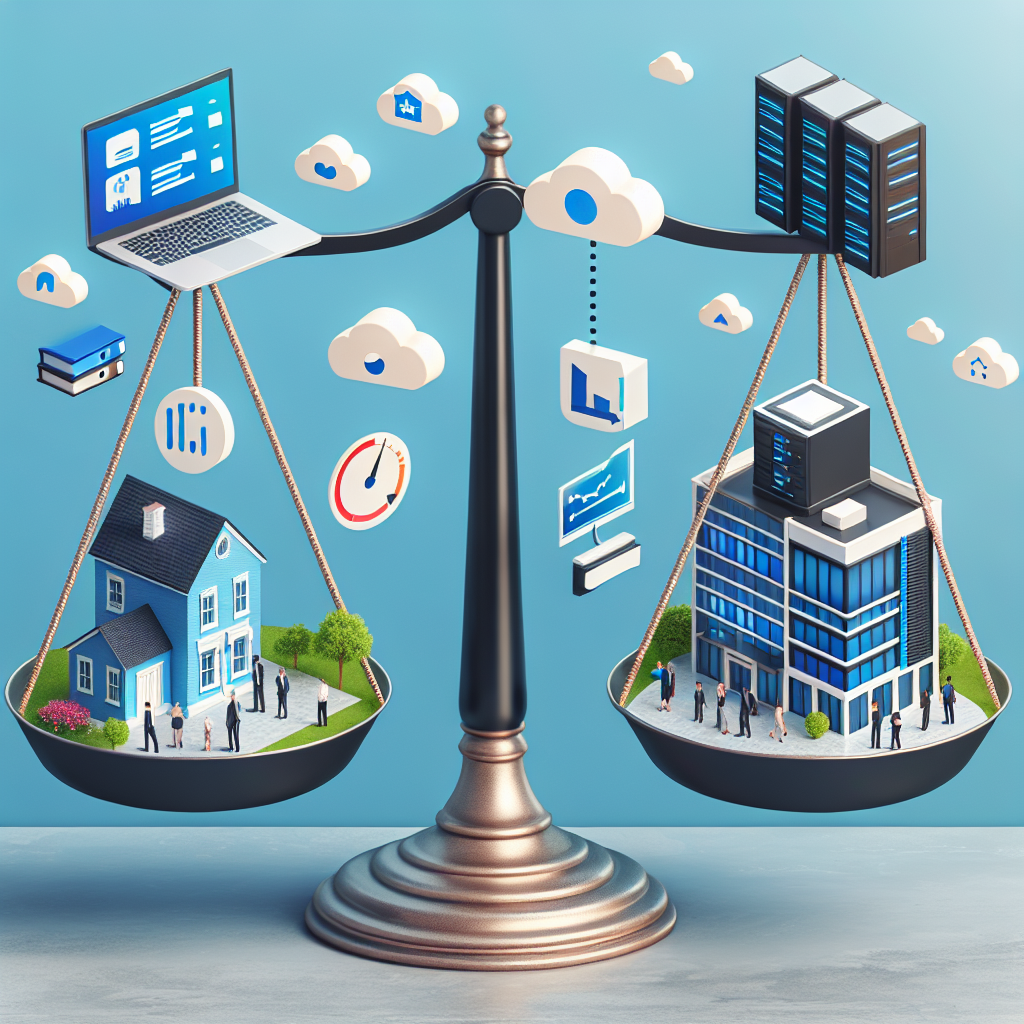Your cart is currently empty!
Tag: IT Solutions

Cybersecurity: Essential IT Solutions for Protecting Your Data
In today’s digital age, cybersecurity has become more important than ever before. With hackers constantly looking for ways to access sensitive information, it is crucial for businesses to invest in robust IT solutions to protect their data.One of the most essential IT solutions for protecting data is a strong firewall. A firewall acts as a barrier between your internal network and external threats, such as malware and hackers. By monitoring and controlling incoming and outgoing network traffic, a firewall helps to prevent unauthorized access to your data.
Another crucial IT solution for data protection is encryption. Encryption converts data into a code that can only be deciphered by authorized users with the appropriate decryption key. This helps to ensure that even if hackers were able to access your data, they would not be able to read or use it.
Regularly updating software and operating systems is also essential for data security. Software updates often include patches for security vulnerabilities, so failing to update can leave your systems exposed to potential threats. By staying up-to-date with software updates, you can minimize the risk of data breaches.
Implementing multi-factor authentication is another important IT solution for protecting data. Multi-factor authentication requires users to verify their identity through multiple methods, such as a password and a one-time code sent to their phone. This adds an extra layer of security to prevent unauthorized access to sensitive data.
Regularly backing up data is also crucial for data protection. In the event of a cyberattack or data breach, having backups of your data ensures that you can quickly restore your systems and minimize the impact of the attack.
Overall, investing in these essential IT solutions is crucial for protecting your data and safeguarding your business against cyber threats. By implementing strong firewalls, encryption, software updates, multi-factor authentication, and regular data backups, you can significantly reduce the risk of data breaches and keep your sensitive information safe from hackers.

The Role of Cloud Computing in Modern IT Solutions
Cloud computing has revolutionized the way businesses operate in the modern world. It has become an integral part of IT solutions, offering a wide range of benefits to organizations of all sizes. From cost savings to increased flexibility, the role of cloud computing in modern IT solutions cannot be understated.One of the key benefits of cloud computing is its cost-effectiveness. By moving their IT infrastructure to the cloud, organizations can reduce their hardware and operational costs significantly. With cloud computing, businesses no longer need to invest in expensive hardware and software licenses, as everything is hosted and managed by a third-party provider. This allows organizations to scale their IT resources up or down based on their needs, saving them money in the long run.
Cloud computing also offers increased flexibility and agility to businesses. With cloud services, organizations can quickly deploy new applications and services without the need for complex and time-consuming installations. This allows businesses to respond to market changes and customer demands more effectively, giving them a competitive edge in today’s fast-paced business environment.
Furthermore, cloud computing provides enhanced security and data protection. Cloud service providers invest heavily in security measures to protect their customers’ data from cyber threats and breaches. This ensures that sensitive information is kept safe and secure at all times, giving businesses peace of mind when it comes to their data security.
Another key benefit of cloud computing is its scalability. Businesses can easily scale their IT resources up or down based on their needs, without the need for costly hardware upgrades or installations. This allows organizations to adapt to changing business requirements and growth opportunities more effectively, ensuring that they remain competitive and innovative in their respective industries.
In conclusion, the role of cloud computing in modern IT solutions is paramount. From cost savings to increased flexibility and security, cloud computing offers a wide range of benefits to businesses looking to streamline their IT operations and enhance their overall efficiency. As technology continues to evolve, cloud computing will undoubtedly play a crucial role in shaping the future of IT solutions for organizations around the world.

Maximizing ROI with Integrated IT Solutions
In today’s fast-paced business environment, companies are constantly looking for ways to maximize their return on investment (ROI) in technology solutions. One effective way to achieve this is by integrating various IT solutions into a cohesive and streamlined system. This approach, known as Integrated IT Solutions, can help businesses improve efficiency, reduce costs, and drive innovation.Integrated IT Solutions involve combining different technology systems, applications, and processes to create a seamless and interconnected infrastructure. This allows for better communication and collaboration between different departments and functions within an organization. By integrating IT solutions, companies can eliminate data silos, streamline workflows, and improve overall productivity.
One of the key benefits of Integrated IT Solutions is the ability to reduce costs. By consolidating systems and applications, businesses can eliminate redundancies and optimize resources. This can lead to significant cost savings in terms of hardware, software, and maintenance expenses. Additionally, integrated IT solutions can help companies avoid costly integration projects in the future, as everything is already connected and working together seamlessly.
Another advantage of Integrated IT Solutions is improved efficiency. When different systems and processes are integrated, employees can access information quickly and easily, leading to faster decision-making and improved productivity. This can help businesses stay competitive in today’s fast-paced market and adapt to changing customer demands more effectively.
Integrated IT Solutions also enable companies to drive innovation and stay ahead of the curve. By having a cohesive technology infrastructure in place, businesses can more easily adopt new technologies and implement new solutions. This can help companies stay agile and respond quickly to market changes, giving them a competitive edge in their industry.
Overall, maximizing ROI with Integrated IT Solutions is essential for businesses looking to stay ahead in today’s digital age. By integrating different systems and processes, companies can reduce costs, improve efficiency, drive innovation, and ultimately achieve a higher return on their technology investments. With the right strategy and implementation, Integrated IT Solutions can help businesses thrive and succeed in a rapidly evolving business landscape.

The Benefits of Implementing Customized IT Solutions for Your Company
In today’s fast-paced and technology-driven business world, it is essential for companies to stay ahead of the curve when it comes to their IT solutions. One way to achieve this is by implementing customized IT solutions that are tailored to meet the specific needs and goals of your company. While off-the-shelf software and hardware solutions can be convenient, they often lack the flexibility and customization options that are necessary for a truly efficient and effective IT infrastructure.Customized IT solutions offer a wide range of benefits for companies of all sizes and industries. One of the biggest advantages is that they can be designed to align with the unique requirements and workflows of your business. This means that you can have a system that is specifically tailored to meet your company’s goals, rather than trying to fit your operations into a one-size-fits-all solution.
Another benefit of implementing customized IT solutions is increased efficiency and productivity. By streamlining processes and automating repetitive tasks, custom solutions can help your employees work more efficiently and focus on higher-value tasks. This can lead to cost savings, improved performance, and ultimately, increased profitability for your company.
Customized IT solutions also offer improved security and data protection. With cyber threats on the rise, it is more important than ever for companies to have robust security measures in place to protect their sensitive information. Customized solutions can be designed with the latest security protocols and technologies to ensure that your data is safe from unauthorized access and cyber attacks.
Additionally, customized IT solutions can provide scalability and flexibility for your company as it grows and evolves. With a customized system, you can easily add new features and functionalities as needed, without having to completely overhaul your IT infrastructure. This can help your company stay competitive and agile in a rapidly changing market.
Overall, implementing customized IT solutions can provide numerous benefits for your company, including increased efficiency, productivity, security, and scalability. By investing in a system that is tailored to your specific needs and goals, you can position your company for future success and growth in the digital age.

How IT Solutions Can Revolutionize Your Business Strategy
In today’s fast-paced and technology-driven world, businesses are constantly looking for ways to stay ahead of the competition. One of the most effective ways to do this is by leveraging the power of IT solutions to revolutionize their business strategy.IT solutions encompass a wide range of technologies and tools that can help businesses streamline their operations, improve efficiency, and drive growth. From cloud computing and big data analytics to artificial intelligence and cybersecurity, these solutions have the potential to transform the way businesses operate and compete in the market.
One of the key ways in which IT solutions can revolutionize a business strategy is by enabling better decision-making. With access to real-time data and analytics, businesses can make more informed decisions that are based on facts rather than intuition. This can help to identify new opportunities, optimize processes, and drive innovation.
IT solutions can also help businesses to improve their customer experience. By leveraging technologies such as customer relationship management (CRM) software, businesses can better understand their customers’ needs and preferences, and tailor their products and services accordingly. This can lead to increased customer satisfaction, loyalty, and retention.
Furthermore, IT solutions can help businesses to enhance their productivity and efficiency. By automating repetitive tasks, streamlining workflows, and eliminating manual processes, businesses can free up time and resources to focus on more strategic initiatives. This can lead to cost savings, increased productivity, and a competitive edge in the market.
In addition, IT solutions can also help businesses to strengthen their cybersecurity posture. With the increasing threat of cyber attacks and data breaches, businesses need to ensure that their sensitive information is protected. IT solutions such as firewalls, encryption, and intrusion detection systems can help businesses to safeguard their data and mitigate risks.
Overall, IT solutions have the potential to revolutionize a business strategy by enabling better decision-making, improving customer experience, enhancing productivity, and strengthening cybersecurity. By investing in the right technologies and tools, businesses can position themselves for success in today’s digital age. It is essential for businesses to stay abreast of the latest IT trends and innovations in order to stay competitive and drive growth.

Innovative IT Solutions for Enhancing Productivity and Efficiency
In today’s fast-paced business world, staying ahead of the competition requires innovative IT solutions that can enhance productivity and efficiency. With the increasing reliance on technology in every aspect of business operations, companies are constantly seeking ways to streamline processes and improve overall performance.One of the key areas where IT solutions can make a significant impact is in the realm of communication. With the rise of remote work and global teams, having effective communication tools is essential for keeping employees connected and informed. Collaborative platforms like Slack, Microsoft Teams, and Zoom allow team members to communicate in real-time, share documents, and collaborate on projects regardless of their physical location. These tools not only facilitate better communication but also help to improve teamwork and efficiency.
Another area where IT solutions are revolutionizing business operations is in the realm of project management. Tools like Trello, Asana, and Jira enable teams to organize tasks, set deadlines, and track progress on projects in a more efficient and transparent manner. These platforms provide a centralized place for team members to collaborate, share updates, and stay on top of project timelines, leading to improved productivity and project outcomes.
Automation is another key component of innovative IT solutions that can significantly enhance productivity and efficiency. By automating repetitive tasks and processes, businesses can free up valuable time and resources that can be redirected towards more strategic initiatives. Automation tools like Zapier, IFTTT, and robotic process automation (RPA) software can help businesses streamline workflows, reduce errors, and increase efficiency across various departments.
Furthermore, data analytics and business intelligence tools are becoming increasingly important for businesses looking to make informed decisions based on real-time data. These tools help organizations analyze large volumes of data, identify trends and patterns, and gain valuable insights that can drive business growth and optimize operations. Whether it’s tracking sales performance, monitoring customer behavior, or predicting market trends, data analytics tools can provide businesses with the information they need to make smarter decisions and stay ahead of the competition.
In conclusion, innovative IT solutions play a crucial role in enhancing productivity and efficiency in today’s business landscape. From communication and project management tools to automation and data analytics, businesses can leverage technology to streamline processes, improve collaboration, and make more informed decisions. By investing in the right IT solutions, companies can stay competitive, drive growth, and achieve their business goals more effectively.

The Top IT Solutions to Streamline Your Business Operations
In today’s fast-paced business environment, technology plays a crucial role in streamlining operations and increasing efficiency. With the right IT solutions, businesses can automate processes, improve communication, and enhance productivity. Here are some top IT solutions that can help streamline your business operations:1. Cloud Computing: Cloud computing allows businesses to store and access data and applications over the internet, rather than on local servers. This solution offers scalability, flexibility, and cost-effectiveness, making it easier for businesses to access resources and collaborate with team members from anywhere in the world.
2. Enterprise Resource Planning (ERP) Systems: ERP systems integrate various business functions, such as finance, human resources, and supply chain management, into a single platform. This solution helps businesses streamline processes, improve decision-making, and enhance collaboration across departments.
3. Customer Relationship Management (CRM) Software: CRM software helps businesses manage customer relationships and interactions, track sales leads, and improve customer service. This solution enables businesses to centralize customer data, automate marketing campaigns, and analyze customer behavior to drive sales and improve customer satisfaction.
4. Business Intelligence (BI) Tools: BI tools enable businesses to analyze and visualize data to make informed decisions and optimize performance. These tools can help businesses identify trends, forecast sales, and monitor key performance indicators to improve operations and drive growth.
5. Collaboration Tools: Collaboration tools, such as project management software and communication platforms, help teams work together more effectively and efficiently. These tools enable teams to share files, communicate in real-time, and track progress on projects, leading to improved collaboration and productivity.
6. Security Solutions: With the increasing risk of cyber attacks and data breaches, businesses need to invest in security solutions to protect their sensitive information. Security solutions, such as firewalls, antivirus software, and encryption tools, help businesses safeguard their data and prevent unauthorized access.
7. Mobile Applications: Mobile applications enable businesses to access information and communicate with customers and employees on the go. These applications can streamline processes, improve customer engagement, and increase productivity by providing access to key data and tools anytime, anywhere.
By implementing these top IT solutions, businesses can streamline their operations, improve efficiency, and stay competitive in today’s digital landscape. Investing in the right technology can help businesses drive growth, reduce costs, and enhance customer satisfaction, ultimately leading to long-term success.

Measuring ROI: Calculating the Value of Your IT Solutions Investment
Measuring ROI: Calculating the Value of Your IT Solutions InvestmentIn today’s technology-driven world, businesses rely heavily on IT solutions to streamline operations, improve efficiency, and stay competitive in the market. However, investing in IT solutions can be a significant expense, and it’s crucial for businesses to measure the return on investment (ROI) to ensure that they are getting the most out of their IT investments.
Calculating the ROI of your IT solutions investment involves evaluating the costs associated with implementing and maintaining the technology, as well as the benefits it provides to your business. By understanding the value that IT solutions bring to your organization, you can make informed decisions about future investments and optimize your technology budget.
There are several key factors to consider when measuring the ROI of your IT solutions investment. First, you need to calculate the initial costs of acquiring and implementing the technology, including hardware, software, licensing fees, and any consulting or training expenses. You should also factor in ongoing costs such as maintenance, support, and upgrades to keep the technology running smoothly.
Next, you need to quantify the benefits that the IT solutions provide to your business. This could include increased productivity, improved customer satisfaction, reduced operational costs, and enhanced data security. By identifying the specific ways in which the technology adds value to your organization, you can more accurately measure its impact on your bottom line.
To calculate the ROI of your IT solutions investment, you can use the following formula:
ROI = (Net Benefit / Total Costs) x 100
Net Benefit = Total Benefits – Total Costs
By comparing the net benefit of the IT solutions to the total costs, you can determine the percentage return on investment that the technology is delivering to your business. A positive ROI indicates that the IT solutions are generating value for your organization, while a negative ROI may signal that adjustments need to be made to improve the effectiveness of the technology.
In addition to calculating the financial ROI of your IT solutions investment, it’s also important to consider the intangible benefits that the technology provides. These could include improved employee satisfaction, enhanced decision-making capabilities, and a competitive edge in the market. While these benefits may be more difficult to quantify, they can still have a significant impact on the overall value of your IT investments.
Measuring the ROI of your IT solutions investment is essential for making informed decisions about technology spending and maximizing the value that technology brings to your business. By evaluating both the costs and benefits of your IT solutions, you can ensure that you are making strategic investments that drive growth and innovation in your organization.

How IT Solutions Can Help Small Businesses Compete with Larger Companies
In today’s competitive business landscape, small businesses often struggle to keep up with larger companies that have more resources and manpower. However, with the right IT solutions in place, small businesses can level the playing field and compete effectively with their larger counterparts.One of the key advantages that IT solutions offer small businesses is increased efficiency. By automating repetitive tasks and streamlining processes, small businesses can save time and resources that can be better utilized in other areas of the business. For example, cloud-based project management tools can help small businesses collaborate more effectively, while customer relationship management (CRM) software can help them better understand and engage with their customers.
Additionally, IT solutions can help small businesses improve their customer service and enhance the overall customer experience. For instance, chatbots and virtual assistants can provide round-the-clock support to customers, while data analytics tools can help small businesses better understand their customers’ preferences and behavior. By leveraging IT solutions, small businesses can personalize their interactions with customers and provide a more tailored experience that can help them stand out in a crowded marketplace.
Furthermore, IT solutions can help small businesses better manage their finances and resources. Accounting software can help small businesses track expenses, manage invoices, and generate financial reports, while inventory management tools can help them optimize their supply chain and reduce costs. By having a clear picture of their financial health and resources, small businesses can make more informed decisions that can help them grow and compete with larger companies.
Lastly, IT solutions can help small businesses stay agile and adapt to changing market conditions. With the rise of e-commerce and digital marketing, small businesses need to be able to quickly respond to market trends and customer demands. By leveraging IT solutions such as e-commerce platforms and digital marketing tools, small businesses can reach a wider audience and stay ahead of the competition.
In conclusion, IT solutions can be a game-changer for small businesses looking to compete with larger companies. By increasing efficiency, improving customer service, managing finances, and staying agile, small businesses can level the playing field and thrive in today’s competitive business landscape. Investing in the right IT solutions can help small businesses not only survive but thrive in the long run.

IT Solutions for Remote Work: Enhancing Collaboration and Productivity
In recent years, the concept of remote work has become increasingly popular among companies and employees alike. With advancements in technology, it has become easier than ever for individuals to work from anywhere in the world. However, remote work also comes with its own set of challenges, particularly when it comes to collaboration and productivity.One of the key components of successful remote work is having the right IT solutions in place to enhance collaboration among team members. With the right tools and technology, employees can communicate effectively, share information, and work together seamlessly, regardless of their physical location.
There are a variety of IT solutions available that can help remote teams collaborate more effectively. One popular option is cloud-based collaboration platforms, such as Microsoft Teams or Slack, which allow team members to communicate in real-time, share documents, and collaborate on projects from anywhere. These platforms also offer features like video conferencing, screen sharing, and instant messaging, making it easy for team members to stay connected and productive.
Another important IT solution for remote work is project management software, such as Asana or Trello. These tools allow teams to track project progress, assign tasks, set deadlines, and collaborate on projects in a centralized and organized manner. By having a clear overview of project timelines and responsibilities, team members can stay on track and ensure that work is completed efficiently.
In addition to collaboration tools, remote workers also need access to reliable and secure IT infrastructure. This includes high-speed internet connections, virtual private networks (VPNs) for secure data transmission, and remote desktop software for accessing company systems and files from anywhere. By ensuring that employees have access to the necessary IT resources, companies can help remote workers stay productive and connected.
Overall, IT solutions play a crucial role in enhancing collaboration and productivity for remote teams. By investing in the right tools and technology, companies can empower their employees to work efficiently and effectively, regardless of their physical location. With the right IT solutions in place, remote work can be a seamless and successful experience for both employees and employers.
